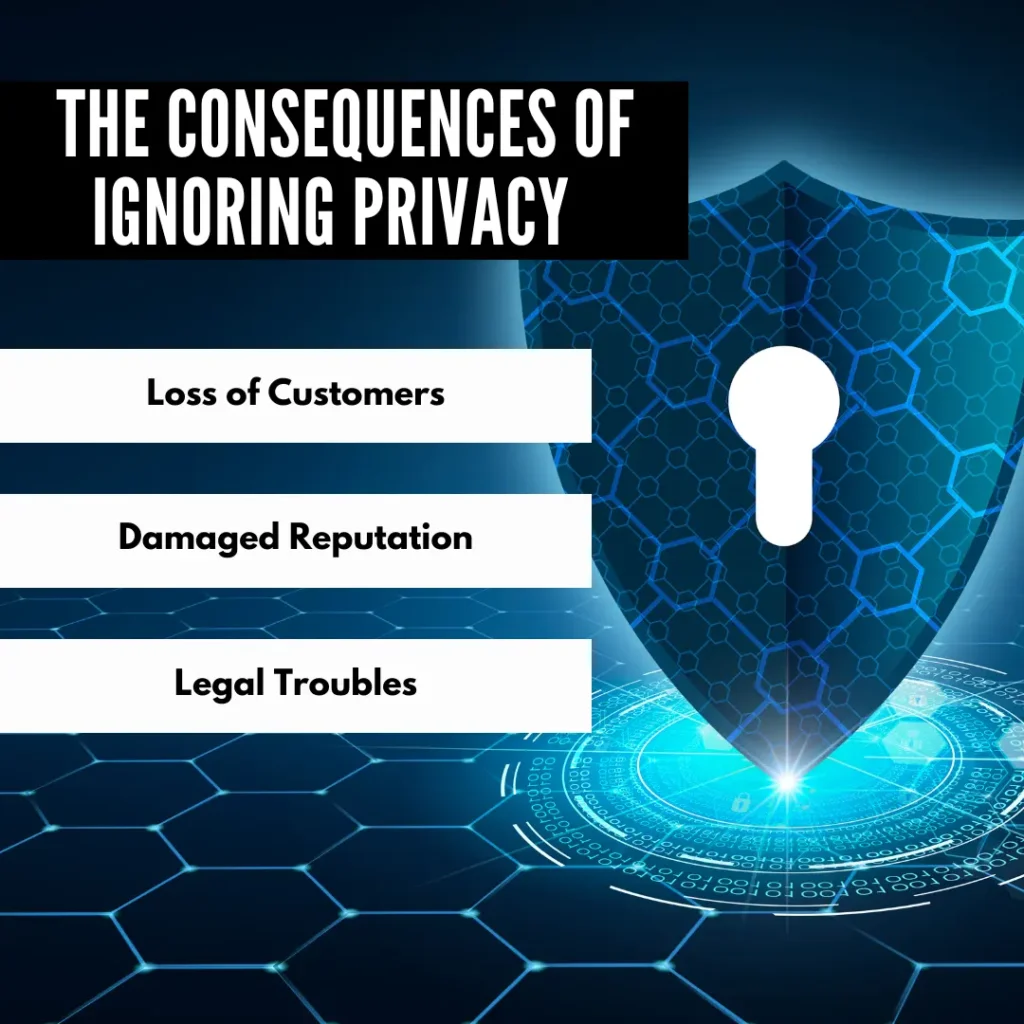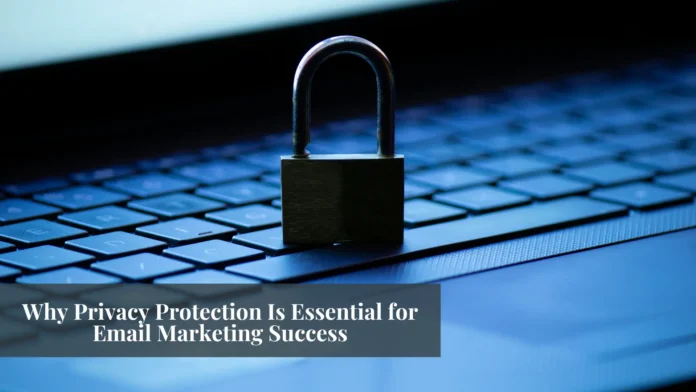Email marketing is one of the most effective ways for businesses to communicate with their audience. It’s fast and personal, allowing businesses to send updates, promotions, and valuable information to customers’ inboxes. However, with this convenience comes a significant responsibility, protecting the privacy of customers and respecting their trust.
Privacy protection is not about avoiding fines or rules but about showing you care about your customers and their private information. Without privacy, businesses run the risk of losing the trust of their customers and harming their reputations.
This article will detail why privacy protection is crucial in email marketing, its consequences for businesses and customers, and how businesses could design campaigns that are both impactful and privacy-savvy.
The Connection Between Privacy and Trust
Imagine this: You begin to get emails from a company you’ve never corresponded with. You question how they got your email address. You resent it and mark it as spam or unsubscribe from the mailing list. But what happens when businesses do not respect privacy?
There must be trust between the business and the recipient. Trust will keep people opening up their emails, clicking on the links, and interacting with content.
Building trust with the help of https://sparkle.io/email-verifier/ makes you meet the demands of regular communication, transparency, and respect for the customer’s preferences.
When customers trust that their information is safe and used responsibly, they are more likely to pay attention to the emails that you send out. If they feel it is mishandled or abused, they lose faith in a brand very fast.
Privacy Laws: Why They Matter
The world appreciates the consumer privacy rights and laws to encourage organizations to treat their data appropriately. Such laws assist in strengthening the consumer’s power to control their information and make corporations legally liable in case of misuse. Here are some of the most well-known privacy laws:
General Data Protection Regulation (GDPR) (Europe):
GDPR can be nicknamed the toughest privacy laws globally, bar none. It demands that a business can only capture and use PII about an individual for marketing without their permission. It also accords them privileges such freedom to access their data, amend or even erase it if they wish to.
California Consumer Privacy Act (CCPA) (United States):
The CCPA also has provision for the privacy rights of California residents concerning his or her information, whether that information will be sold, and to whom it is sold. Also, consumers should be allowed the right to opt out of selling your data.
CAN-SPAM Act (United States):
This law covers business emails and requires that corporate communications provide the recipient an unrestrained opportunity to decline to receive more messages of the same type. It also means sending correct subject lines and sender names.
It is not just about not facing legal repercussions for failing to adhere to these laws; it has more to do with justice for your customers. Firms that demonstrate compliance notify their audience that the firms are concerned with the privacy aspect, which will tremendously boost trust and usage.
Benefits of Privacy Protection for Businesses
Customer privacy protection is not only a legal requirement but also brings direct benefits to businesses. Here’s how focusing on privacy can directly impact your success:
- Builds Customer Loyalty: Customers are likely to be valued and cared for if they feel that the business is concerned about its privacy. Loyalty customers do not only open emails but will also make repeated purchases and even refer others to the business.
- Enhances Email Performance: Emails sent to people who want to receive emails from you tend to perform better. If the email recipient feels comfortable with the source of the message and trusts the sender, the open rates, click-through rates, and conversion rates tend to increase.
- Helps Avoid Penalties and Lawsuits: Non-compliance to privacy laws risks a business firm with heavy fines, lawsuits, and reputational damages. By ensuring compliance with privacy rules, businesses may avoid these and focus on their audience growth.
- Improves Brand Reputation: A business known for respecting people’s privacy stands out in a very competitive market. Most customers will go ahead to support companies that embrace ethical practices, such as maintaining transparency.
How to Protect Privacy in Email Marketing
Protecting privacy in your email marketing approach does not need to be that complicated. Here are practical steps every business can take:
1. Get Permission First
Ethical email marketing is a permission-based approach. Never subscribe anyone to an email list without their permission. Always use the “opt-in” system– your customers must affirmatively agree to receive your email messages.
Include an extra layer of protection through “double opt-in.” Upon completing the sign-up form, subscribers will be emailed to confirm the subscription. It prevents spammers from adding any wrong subscribers as this confirms only interested individuals get onto your list. Avoid purchasing any email list whatsoever.
2. Use Secure Systems
Select an email marketing platform that is security-conscious and compliant. Ensure that the chosen platform supports data encryption, security updates, and compliance with privacy laws. Top email marketing platforms have security features that protect customers’ information.
3. Be Transparent
Clearly state how customer information will be used. Add a link to your privacy policy on your sign-up forms and make it accessible. Transparency breeds trust and minimizes the chances of miscommunication.
4. Make it Easy to Opt-Out
Respect customer preferences by making it easy to unsubscribe. Every marketing email should have an “unsubscribe” link that is easily found and works smoothly.
5. Restrict data collection
Collect only the information you need. As an example, asking only for an email address and a name can usually suffice for most mailings. Do not solicit private information unless there is a legitimate need for it.
6. Clean your email list regularly
An outdated or inactive email list can hurt your performance and reputation. Regularly review your list and remove inactive subscribers or invalid email addresses. This ensures you’re only contacting genuinely interested people.
The Consequences of Ignoring Privacy
Failing to protect customer privacy can lead to serious consequences, including:
- Loss of Customers: People won’t stick with a business they don’t trust. When customers feel their privacy has been violated, they are more likely to unsubscribe, report emails as spam, or stop supporting the brand altogether.
- Damaged Reputation: Privacy breaches can cause long-term damage to a company’s reputation. News of a data breach spreads quickly, and rebuilding trust after such an incident can take years.
- Legal Troubles: Companies that violate privacy laws risk lawsuits and financial penalties. These fines can be substantial, especially under laws like GDPR.

The Future of Privacy in Email Marketing
The expectation of privacy also changes with changing technology. More and more customers are realizing how their data is being used, and thus are demanding transparency from businesses.
To stay ahead in the market, businesses have to implement privacy-first practices and invest in secure email marketing systems. It can be done only when customer privacy becomes the focal point of a strategy. With such a focus, companies will develop stronger relationships and ensure long-term success.
Conclusion
Privacy protection is not just a legal obligation but the very foundation of successful email marketing. The more customers trust you, the more interested they will be in your campaign and loyal to your brand.
The more customers know that their data is in safe hands, the more likely they are to engage with your brand. Protecting privacy is not just the right thing to do; it is the smart thing for any business looking to thrive in today’s competitive market.
FAQs
Why is email privacy important?
Email privacy is important because it protects your personal information from being shared or misused. It helps keep your data safe from hackers and prevents unwanted spam or scams.
Do you need a privacy policy for email marketing?
Yes, a privacy policy is needed for email marketing. It tells people how you will use, store, and protect their information, which builds trust and keeps you legally compliant.
What makes email marketing successful?
Email marketing is successful when it has clear messages, a personal touch, and valuable content. A strong subject line and respect for privacy also help keep people engaged.



































